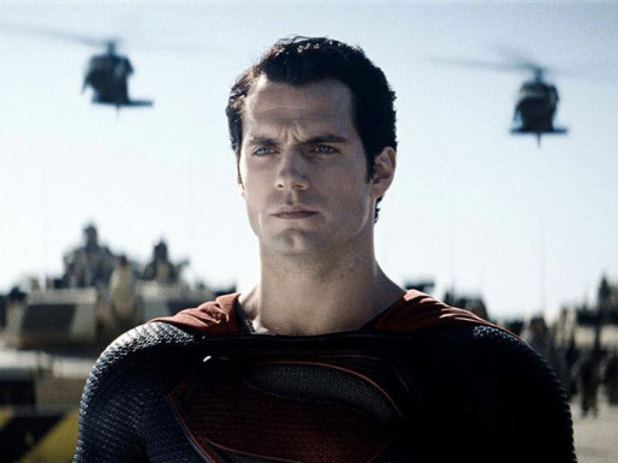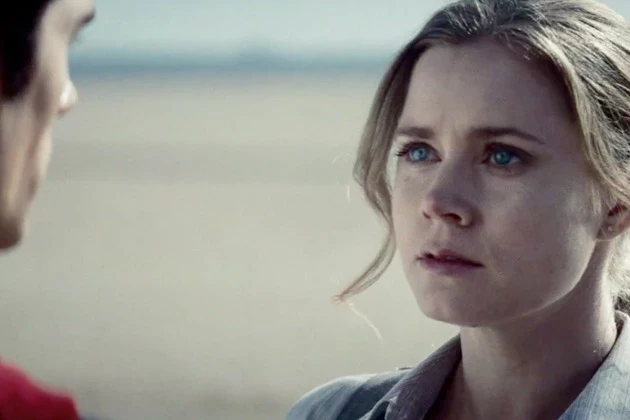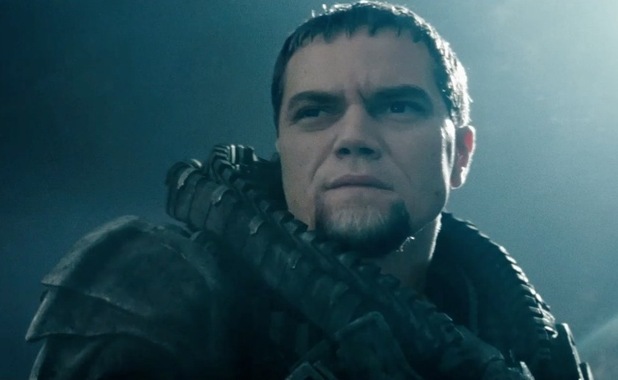In 2006, Bryan Singer's Superman Returns was released in cinemas. Halfway between a franchise reboot and sequel to Richards Donner and Lester's Superman: The Movie and Superman II, Returns garnered largely positive reviews yet failed to find popularity amongst audiences, and fared poorly at the box office. A sequel was said to be in the works, and if the law of superhero sequels, exemplified by X-Men 2, Spiderman 2, and The Dark Knight holds any water, Singer's sequel could have been something special. Sadly, Superman Returns' failure at the box-office ultimately led to its follow up being axed. One rumoured title for that film was Man of Steel: now, seven years on, a new film directed by Zach Snyder, unconnected to both Superman Returns and its predecessors, but bearing that title, is released. And, oh, won't it make you yearn for what could have been, as 2013's Man of Steel is not only one of the most bloated, muddled and boring superhero films in recent memory, but also one of the worst films of the year. Yes, Zach Snyder has once again demonstrated that character, dialogue and tension are secondary concerns in favour of empty spectacle, dreary cinematography and obnoxious stylisation.
Coming from the director of the risible Sucker Punch, it comes as little surprise that Man of Steel fails to match the verisimilitude and the emotional nuance of either Richard Donner and Bryan Singer's iterations of the character. However, what disappoints the most is the broken promise of the excellent marketing campaign. Man of Steel's trailers were suggestive of a reflective, toned-down character piece: an examination of what it means to be a man of steel, a companion, if you will, to Christopher Nolan's analysis of Batman in The Dark Knight. Snyder's title invites comparisons to Nolan's film, and indeed, much of the reticence over Snyder's hiring as director was assuaged by Nolan's dual role as producer and story supervisor. Because of this, Man of Steel's abject failure as a weighty, grown-up comic adaptation is felt all the more acutely.
 |
| Steel-jawed: Cavill is undoubtedly the right fit for Kal-El. |
That mentality, of 'it's good because it looks cool', is at the heart of everything that is wrong with Man of Steel, and more broadly, Snyder's approach as a director. As Mark Kermode rightly pointed out in his review of Watchmen, Snyder is clearly in thrall with the source material, approaching Superman with reverence and passion. He understands that when Superman dons the suit it must feel momentous, and that when he meets Lois Lane it must lead to romance. But he fundamentally does not understand why Superman wears the suit, or why he and Lois can and do fall in love. For all Man of Steel's navel-gazing ponderous tone, Snyder is incapable of exploring the reasons behind character motivation or narrative theme. This works when you are making a visceral exploitation film like his remake of Dawn of the Dead, but it does not work here, especially when the film constantly tells us how important this story is. Superman is arguably the most iconic character in Western pop culture, and indeed, Snyder recognises that iconography, but he categorically does not understand it. He sees Superman's 'S', but he cannot see the man behind it.
 |
| One of Adams' few scenes with Cavill. |
Richard Donner knew that his Superman had to feel relatable: heroic yes, but also flawed: when Superman reverses time and saves Lois, he does so at the expense of his promise not to interfere with Earth's history, as well as being motivated by his past failure to save his father's life. Bryan Singer, too, knew that drama is more than smashing into buildings and melting things with heat-vision: his Superman suffered the consequences of leaving Lois behind for 6 years to get on with her life without him. Singer and Donner are directors that understand that the essentials of storytelling - drama, tension, character - come from internal conflict, and that action, however spectacular, is merely the external manifestation of that conflict. Zach Snyder simply does not understand this, seeing only the surface and mistaking that for the story. His response to a scene not working on an emotional level is to drain the colour, turn up the bass and crudely zoom in the camera, as if to force us to look harder for that elusive drama. You can look as hard as you like: in Snyder's cinema there are images but no imagery; things happen but there is no story. The result of this profound shallowness is that in this vision of Superman, every box that we expect to be ticked is done so blankly and without interrogation - the suit, Jonathan Kent, Jor-El, Lois, the Daily Planet are all here - but none of them have the slightest depth or meaning beyond the audience cooing over their presence on the screen.
This lack of depth could (maybe) be forgiven if, as with last year's marvelous Avengers, Man of Steel contained any sense of levity, humour or fun. Even the brooding Dark Knight trilogy had moments of all three, ably offered by supporting characters Alfred and Lucius Fox. Man of Steel, however, has none of this balance, seemingly worried that any injection of lightness may detract from its ponderous tone. Snyder is apparently unaware that it is the flashes of light that make the darkness that much more effective: it's devastating when Lois dies in Donner's Superman, but in Man of Steel, when literally tens of thousands of Metropolis' citizens are killed in a spectacular yet vacuous showdown between Superman and Zod, we barely bat an eyelid.
It is the climactic action sequences that have drawn the film's biggest approbations, with Devin Faraci of Badass Digest claiming that Man of Steel has 'the best superhero action ever put to film'. With respect, it seems 'best' has become confused with 'loudest'. The scale of destruction in the film's final act has a bizarre disconnect between a body count (people caught between the Kryptonian smackdown are obliterated with a giddy abandon yet unseen in a Superman movie), and any sense of consequence whatsoever. How do you make a fight between two indestructible beings exciting? It's a difficult trick to pull off, but Snyder's answer is to smash buildings, and if that doesn't work, smash some more. Then smash more, and more and more. The sheer scale and length of these scenes is so extreme that they very quickly become boring, with no sense of peril or tension, despite the scores of innocent people supposedly perishing in the chaos. Most odd, however, is how difficult it is to tell what is going on, with crash zooms, shaky cameras and irritating close-ups proving just as obnoxious as Snyder's usual propensity for slow motion.
 |
| Michael Shannon is reliably intense as General Zod. |
You may be somewhat surprised to hear, then, that there were things I liked about the film: the casting was perfect, with Henry Cavill proving a great choice for the eponymous hero, and Michael Shannon a perfect fit for the maniacal and passionate Zod. Moreover, the performances were uniformly good, hampered only by a dreadful script by David Goyer, who, without Christopher Nolan's directorial talent for turning clunky exposition into compelling dialogue, delivers line after line that would embarrass a fourteen year old. I liked that Lois Lane knows who Superman is from the start - it sets up a nice future dynamic between Lois and Clark at The Daily Planet, and elegantly sidesteps the inherent silliness of Clark wearing glasses as a disguise. It's a shame then, that Amy Adams and Cavill have absolutely zero chemistry, hampered by a plot that only gives them a handful of scenes together. Moreover, in those few scenes, they are laden with passionless exposition. Kevin Costner invests his Jonathan Kent with a degree of depth, conflicted by the desire to protect his son from an ignorant world, and the understanding that Clark will one day have to confront his place in the world, but this is undermined by the senseless and frustrating manner of his untimely death.
There are potentially many things to like about Man of Steel, but almost all of them are buried by the film's numerous and inescapable flaws. Lacking depth, subtlety, real tension or even peril, Snyder's re-imagining of Superman is profoundly shallow. But more than that, as I watched Man of Steel, it occured to me that I was watching the death of the superhero film as a major genre. This year we've had Superman, Iron Man, and we are due another Wolverine film (did anyone even want one?). Next year we get to team up with the X-Men again, Spiderman has another crack at amazing us, and in 2015 the Avengers will assemble once more. This is not to mention the host of auxillary features, such as Thor 2 and Captain America 2 that will support these tentpoles. But with production problems on Thor, rumours that Robert Downey Jr. may be recast for Avengers 2, and the endless false-starts for the Justice League movie, I can't help but think that Man of Steel is signalling the superhero cycle's decline: I mean, how many more variations on this story can be written for the big screen? At their best, I love superhero films, and talented writers and directors will always find new stories to tell, and new ways to tell them. But if the superhero genre must go the way of the Western, the Hammer Horror and the Film Noir, I just hope that we can end on something better than this.

Fascinating last paragraph, Chris. I've felt for a while that - particularly in the 'Marvel Cinematic Universe' - this recent cycle of comic book flicks have become too samey. I've taken to watching them on DVD and Netflix, and with the exception of X-Men: First Class, have quite happily skipped through the final 30 mins of carnage that comes with these movies as standard. In their attempt to create something akin to Marvel Comics Universe, they're starting to replicate the problems of that universe: cookie-cutter storytelling, the frittering of jeopardy, interminable cross-selling cross-overs. Can't help but think that the Agents of S.H.I.E.L.D TV show will intensify these problems, rater than dilute them.
ReplyDeleteHonestly feel that if Cavill Superman tried to save a cat up a tree, it would result in smashing three buildings that knocked the cat off the branch... The wholesome goodness of Superman ('statistically the safest way of flying, Miss Lane') completely abandoned.
ReplyDeleteOh, and that ridiculous tentacled world-engine; almost a return of the infamous Mechanical Squid/Spider of the Jon Peters/Kevin Smith "Superman Lives" script (which would have starred Nicholas Cage).
I was more excited by the Wayne Enterprises satellite that Zod was pummelled into.